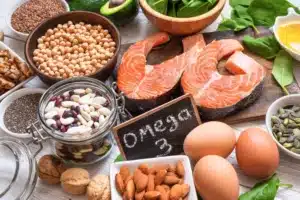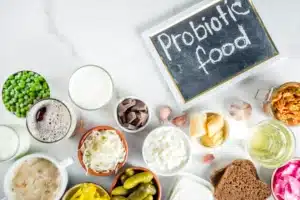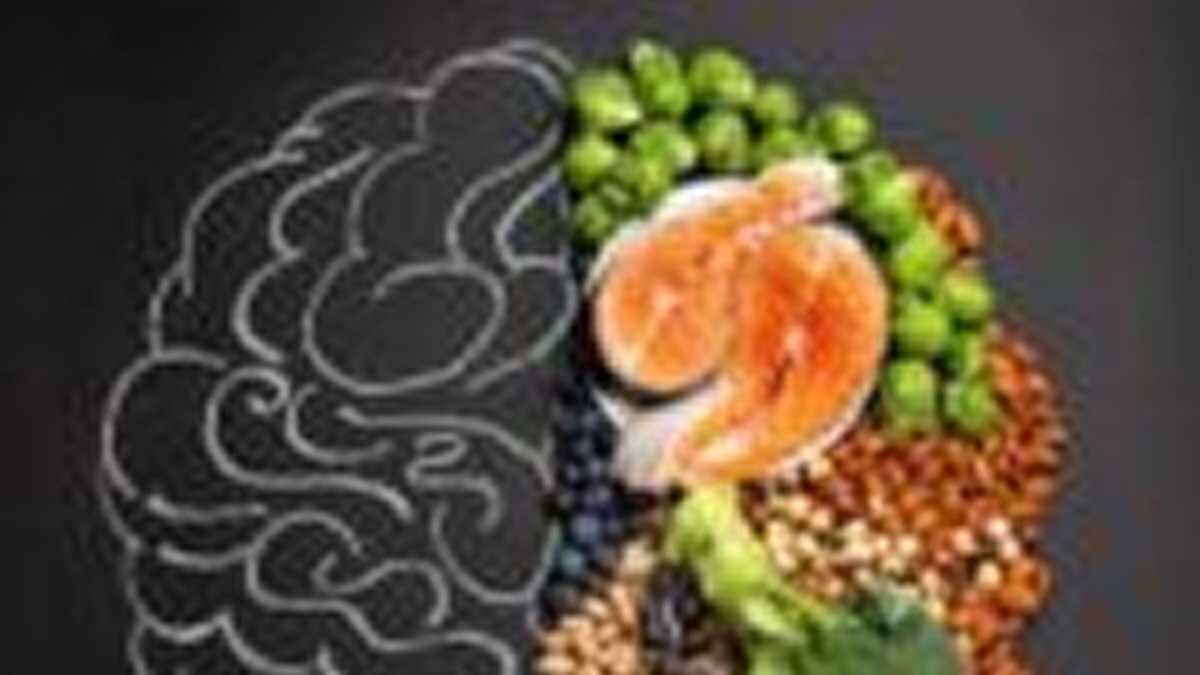Eating Well for Mental Health
You probably know that eating well is crucial for physical health — it fuels our bodies and provides the nutrients we need to thrive. But did you know that good nutrition also plays a crucial role in mental health?
The foods we eat affect our brain function, mood, and overall mental clarity. And the impact goes far beyond just feeling irritable when you’re hungry. A well-balanced diet can enhance resilience to stress, may alleviate symptoms of depression, improve focus, and support better sleep — leading to overall better mood and well-being.
In honor of Mental Health Awareness Month in May, let’s explore how nutrition influences mood and cognitive function and the best foods to eat for mental health.
The Connection Between Healthy Eating and Mental Health
The foods you eat directly impact how you feel, both physically and mentally. Emerging research continues to uncover the link between nutrition, cognitive function, and emotional well-being.
One of the most significant ways nutrition influences mental health is through the gut-brain connection. Your gut microbiota — trillions of bacteria and other microorganisms in your digestive tract — plays a key role in regulating your body’s stress response and mental health conditions like anxiety and depression.1
Imbalances in the microbiota, known as gut dysbiosis, have been linked to mental illnesses. And while factors like genetics, age, sex, and stress levels all affect the composition of bacteria in your gut, guess what is the most powerful influence? Spoiler alert, it’s your diet!2,3
Benefits of Eating Healthy for Mental Health
Research suggests healthy diets rich in fresh fruits and vegetables, whole grains, fatty fish, lean proteins, and nuts and seeds are associated with the following mental health benefits:
- Enhanced mood
- Improved focus and mental clarity
- Reduced stress and anxiety
- Better sleep quality
- Increased reliance to mental health disorders like depression
Best Foods to Eat for Mental Health
The Mediterranean diet, characterized by daily intake of fruit, vegetables, whole grains, legumes, nuts, fish, lean protein, olive oil, and moderate amounts of fermented dairy, is one of the most well-researched dietary patterns for mental health.4 Load up on the following foods to feel your best both mentally and physically.
Fatty Fish
Fatty fish, like salmon, sardines, herring, mackerel, and rainbow trout, is a powerhouse for mental health and well-being. Not only is fatty fish one of the best sources of mood-boosting omega-3 fatty acids, it’s also an excellent source of B vitamins, like vitamin B12, thiamine, folic acid, and niacin.5 In studies, deficiencies in these vitamins are linked to impaired cognition and mental health.1

Fresh Fruits and Veggies
Fruits and vegetables don’t just add color and flavor to your meals — they may also help you feel happier! Studies have linked diets rich in fruits and veggies with higher levels of self-reported happiness, mental health, and well-being.1 Need ideas for quick and easy ways to get your five to nine daily servings? Check out A Better Meal for delicious fruit and veggie-loaded recipes!
Whole Grains
Whole grains like wheat, oats, barley, brown rice, and rye are important sources of prebiotic fiber, which feeds the beneficial gut bacteria that are so critical for good mental health. In a study examining the relationship between diet and five major mental disorders, people who reported never eating wheat were significantly more likely to have mania, bipolar disorder, manic depression, depression, or schizophrenia.6
Nuts and Seeds
Nuts and seeds make for a convenient, brain-boosting snack that may actually lower your risk of depression. In a large 2023 study of over 13,000 participants, people who ate up to 30 grams of nuts (about 23 almonds, 10 whole walnuts, or 15 cashews) daily had a 17% lower risk of developing depression over a five-year period.7
Probiotic-Rich Foods
The 100 trillion microbes living in your gut are crucial for mental health.2,3 Probiotics, live microorganisms that provide beneficial health effects, can help populate your gut with healthy bacteria and maintain microbial balance, supporting mental health. While probiotics can be taken as a supplement, they are naturally found in fermented foods such as:
- Yogurt made with live and active cultures
- Kefir
- Sauerkraut
- Kimchi
- Kombucha
- Tempeh
- Miso
A 2023 review of studies found that probiotic and prebiotic supplementation helped improve mood and reduce symptoms of anxiety and depression by decreasing inflammation and increasing serotonin availability.2

Dark Chocolate
Good news for chocolate lovers! Dark chocolate has been shown to have mood-boosting effects, likely due to its ability to support gut health. A 2022 study found that eating 30 grams of 85% dark chocolate daily for three weeks significantly improved mood and enhanced gut microbial abundance and diversity.8 However, these benefits were not observed with lower cocoa-content chocolates, so opt for varieties with at least 85% cocoa.
Eating for Mental Health — Practical Tips
Support better mental health and stress resilience by implementing these mood-boosting lifestyle habits:
- Follow a Mediterranean-style diet rich in fresh fruits and veggies, whole grains, fish, nuts, and seeds to support long-term mental well-being.
- Stay hydrated. Dehydration is linked with hormone changes and cognitive impairment that may impact your mood. Drink plenty of water, herbal teas, and other fluids daily to feel your best.
- Limit added sugar and processed foods, as these have been associated with higher risk of anxiety, depression, obesity, metabolic syndrome, and other conditions.
- Eat regularly to keep your blood sugar and energy levels more stable and avoid mood swings caused by hunger.
- Practice mindful eating. Slowing down and paying attention to what you eat helps you enjoy your food more and may support healthy digestion.
Support Mental Well-being With Good Nutrition
Improving your mental health starts with what’s on your plate. A balanced diet rich in fruits, veggies, whole grains, fish, nuts, seeds, fermented foods, and dark chocolate can help lower the risk of depression and anxiety, improve your mood, enhance cognitive function, and promote overall well-being.
Small dietary changes can have a profound impact on how your feel mentally and emotionally. Start by incorporating more of the brain-boosting foods highlighted in this article and experience the benefits of healthy eating on mental health firsthand. You’ll love how you feel!
References
- Adan RAH, van der Beek EM, Buitelaar JK, et al. Nutritional psychiatry: Towards improving mental health by what you eat. European Neuropsychopharmacology. 2019;29(12):1321-1332.
- Bistas KG, Tabet JP. The Benefits of Prebiotics and Probiotics on Mental Health. Cureus. 2023;15(8):e43217.
- Ferranti EP, Dunbar SB, Dunlop AL, Corwin EJ. 20 Things you Didn’t Know About the Human gut Microbiome. J Cardiovasc Nurs. 2014;29(6):479.
- Ventriglio A, Sancassiani F, Contu MP, et al. Mediterranean Diet and its Benefits on Health and Mental Health: A Literature Review. Clin Pract Epidemiol Ment Health. 2020;16(Suppl-1):156.
- Serefko A, Jach ME, Pietraszuk M, ?wi?der M, ?wi?der K, Szopa A. Omega-3 Polyunsaturated Fatty Acids in Depression. Int J Mol Sci. 2024;25(16):8675.
- Du Z, Guo S, Sun Y, et al. Causal relationships between dietary habits and five major mental disorders: A two-sample Mendelian randomization study. J Affect Disord. 2023;340:607-615.
- Bizzozero-Peroni B, Fernández-Rodríguez R, Martínez-Vizcaíno V, et al. Nut consumption is associated with a lower risk of depression in adults: A prospective analysis with data from the UK Biobank cohort. Clinical Nutrition. 2023;42(9):1728-1736.
- Shin JH, Kim CS, Cha J, et al. Consumption of 85% cocoa dark chocolate improves mood in association with gut microbial changes in healthy adults: a randomized controlled trial. J Nutr Biochem. 2022;99:108854.

